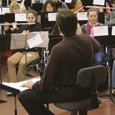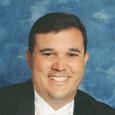Whether the invitation is to lead an all-state honor band or conduct a concert for a school in the next county, guest conducting comes with difficulties different from what directors face in their regular jobs. Here are some tips from veteran guest conductors.
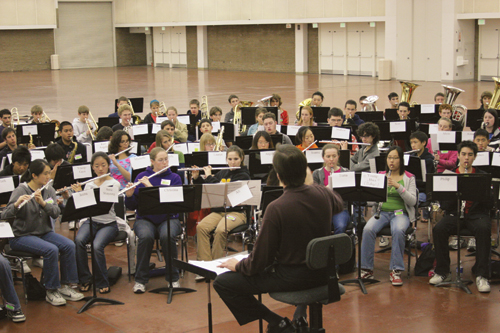
The first time you were invited to guest conduct, how was the invitation made?
Linda R. Moorhouse: My first invitation came in the form of a phone call for a district honor band. I was to conduct the grades 9-10 high school band, and Howard Dunn was to conduct the 11-12 high school band. I was nervous to be working an event with him and will never forget the kind and reassuring words he said to me after watching me at the end of one of my rehearsals that weekend. Not only was he an excellent musician, he was an exceptional teacher and mentor. I also remember having to teach a lot of slide positions and valve combinations during the rehearsal, in part because I chose music recommended by another colleague. The choices included some difficult keys.
T. André Feagin: My first guest conducting invitation came in 2001 with the Victoria College Wind Ensemble in Victoria, Texas. I was living in Victoria at the time, and the idea of connecting with the local community college was appealing. I remember having dinner with the jazz band and wind ensemble director when he asked if I would be interested in conducting a concert with the wind ensemble. Thrilled, I eagerly accepted and we met a few times over the next several weeks to discuss the various details on programming and performance dates.
Bill Thomas: I was teaching in a large 6A high school in western Kansas. One of the band directors at a smaller school in the area asked if I would be interested in conducting a league honor band for some of the small schools also in western Kansas. It was a fairly informal discussion at a District Band event. I asked about how many students are normally in the band, what conductors they had in recent years, what music had been performed, how many hours of rehearsal were scheduled, and how long of a concert was expected. After I agreed, he then called me a few weeks later to discuss specifics and nail down more details.
Scott Hanna: I cannot remember my first invitation, but I do remember thinking how much my first teaching job did to prepare me for a guest artist invitation. That job gave me the opportunity to work on three campuses spanning a wide range of student experience and ability, which honed my sense of how important it is to be mindful of the differing circumstances of each ensemble. It also taught me that people of all levels of experience and ability love music when they are led by someone who loves music.
Caroline Beatty: I don’t recall the first one, but the initial communication is similar from time to time in that I get an email or phone call simply asking if I am available to conduct a band on a particular date.
What questions should a guest conductor ask first?
Beatty: Find out whether you are supposed to make the travel and housing arrangements or if that is being handled through the organizers. The rehearsal schedule is important; sometimes even two-day events have vastly different amounts of rehearsal time depending upon the concert time. I also ask for programs from the last several concerts.
Moorhouse: Some initial questions include how much music they want for the concert and whether there is a budget for newer pieces or rental works. It is good to find out whether students have any other obligations during the event. I have been a guest conductor during music school auditions hosted at a university, ACT/SAT testing weekend, student performances with their bands at all-state events, and sporting events. For a couple of events I was asked to provide copies of the music, which is not something a host should ask the conductor to do.
Feagin: Confirm dates right away. Some opportunities are seasonal, and a guest conductor will most certainly want to know the exact dates and times of the event for scheduling purposes, especially if that guest conductor has full time employment elsewhere. My next few questions are about the structure of the event. I want to know how members are selected for the ensemble; it could be by audition or director recommendation or open to anyone. I also ask how long has this event has existed, what geographical areas are typically involved, the age or grade of the students who participate, what the performance and rehearsal spaces are, and whether there is more than one band at this event. It is also important to find out how much rehearsal time is available and whether extended instrumentation (such as contrabassoon, contrabass clarinet, vocalist, or pianist) is available.
Hanna: In addition to time, date, and place, I ask how far in advance I am expected to arrive, where I will be staying, and when I am expected to depart. I also like to know if I will have any assistance, such as an organizer or a percussion instructor.
Thomas: I ask whether students come already knowing the pieces or have to work everything up that day. I also ask if there is time for sectionals and whether staff and space are available for sectionals. It is important to find out who chooses the music, who the concert is for, and whether there is a concert; sometimes the invitation is for a clinic.
Many guest conductors ask for a repertoire list for the past few years of the ensemble they are guest conducting. What are some of the advantages and disadvantages of this?
Feagin: Past repertoire lists can be a good resource for evaluating what has been done and whether there is a repertoire trend. It also allows the guest conductor to see who else has conducted the ensemble in recent years. I have often checked a repertoire list not for what music was being performed but to learn who was conducting. The music world is small, and being able to pick up the phone or email a former conductor to ask about the experience is a great early step in making yours work as well. The disadvantage is that the past repertoire list can also be a trap. It is better to branch out and explore than to plug into a system that might not work for you. Guest conductors should factor in their knowledge and experience to make their program work. Consider whether there is time to teach a piece intently and efficiently and if a selection will provide a meaningful musical experience to participants. These are all key factors in repertoire selection.
Thomas: Previous programs only give the general level at which students have been playing. Just because an ensemble played a piece last year does not mean they played it well or that they can play it this year. Maybe the students and directors hated it, and this might be something to ask about. It is advantageous to know some of the music that has been played recently so you do not choose the same piece.
Hanna: The past programs provide a great deal of information, but it is also important to ask the people who run the event about the relative success of prior years. The repertoire on the program may have been too difficult or too easy.
Moorhouse: You do not want to repeat something the students have done before in a similar setting. Even more helpful than old programs are previous recordings, where you can judge if the repertoire was programmed well. I also like to see what guest conductors are programming around the country.
If the organizers say that the concert should include 20 minutes of music, how do you prepare your literature selection?
Thomas: The first rule is to avoid going over time. I always look for a chorale, a march, an overture, a novelty piece, a war-horse or transcription, and something new. From that, now I can prioritize what I definitely want to play and then as I begin to read with them, determine what can we play well and then narrow down the list as the day goes.
Beatty: I usually try to find the right big piece and work around that with other appropriate repertoire that provides a nice variety of sounds. I try to see that each section will have a good amount to do. Depending on the level of the group, this can be difficult, especially for low brass and percussion.
Feagin: Twenty minutes of music is typical for some guest conducting opportunities. Before looking at the time frame I typically pull a list together of works that I am interested in performing with the group; my best programs come when I am thinking of the quality of the literature first and the time frame second. This may require sometimes that I perform two pieces instead of the typical three and in some extreme cases, just one. What matters most to me is that I select literature that provides for a variety of musical expression. The time frame normally works itself out.
Moorhouse: I like to program a three to five pieces, from quick-paced tutti works to something slow and lyrical to teach expression and maturity to some type of high-quality standard work in the band literature. I start with the standard work and build the program around it.
Hanna: I select repertoire that will permit five minutes of speaking about the works, introductions, and acknowledgements between pieces.
Knowing the rehearsal schedule ahead of time is an asset and will affect your selection of literature. In what ways do you use the schedule to assist in pacing your rehearsal?
Hanna: The first rehearsal is about you and the musicians getting to know one another musically, understanding how you will work, and establishing expectations for performance in both rehearsals and the concert. I like to begin with a piece that is fairly easy on the first reading to gather as much of this information as possible and start our time together by doing something well.
Feagin: Having time to teach intently and efficiently is key to making your program a success. Some works require more time than others, and I am often conscious of the amount of time available versus the amount of time I think I need to teach the work. If a program is heavy in a specific piece and lighter in others, this will allow you to adjust scheduling accordingly. At the University of Texas at El Paso, I often evaluate the number of total minutes in a rehearsal cycle to the number of minutes I believe it will take to accomplish my musical goals.
Thomas: I determine what the students are capable of both by sightreading as well as how they rehearse. During that initial time, I will work on ensemble tone as well as rehearsal expectations and help them get acquainted to my conducting style and nuances. We will begin working on the pieces that will definitely be programmed. At the first break, I think through what to add or remove that we will begin working on next. Before major breaks, I like to have a run-through of the pieces to tie up loose ends and see where they are so that when we return everybody know what work is left to be completed prior to the concert. Breaks are a time for some sort of closure and wrap-up of that teaching segment.
Moorhouse: If I have a good amount of rehearsal time, I will send the percussion out of the room to sort out their parts with another director or a rehearsal assistant, and then work with the winds on a slow piece to set a standard for tone, intonation, phrasing, and expression. This sets a benchmark of expectations for the weekend. If I have limited rehearsal time, I will try to read through everything in the first rehearsal. After the first rehearsal, I have an idea of what our strengths and weaknesses are and will build the schedule around them. I reserve mornings for those rehearsals that need extra energy and concentration.
Beatty: I break each rehearsal block into time segments for each piece that I want to rehearse and I set goals for each of those segments. This allows me to see on paper that I am getting to each piece sufficiently throughout the entire process.
The first time you take the podium, what do you say to the ensemble?
Hanna: “Hello, I’m Scott Hanna, and I am so happy to be here with you to make music. We are going to have great fun together.” Then I have the oboist give tuning pitches, and we begin.
Beatty: I welcome the students and congratulate them for being in the ensemble (assuming this is an honor group). I briefly say something that lets them know how much I am looking forward to the experience and hope they are, too. Then, I get to playing as soon as possible, because that is what they are there to do. I leave other general announcements for later in the rehearsal, so as not to put everything at the start of rehearsal. One of these is a statement about how professional they need to be in regard to self-correction and replication of what goes right. Telling students you have no doubt they will do that allows them to rise to the occasion.
Moorhouse: I introduce myself and then do everything in my power to create a trusting atmosphere. I will take time at the end of every rehearsal to have the students ask a question of me (actually, they get three questions). By the end of the weekend, the students have a much better glimpse of who that lady is in front of them, and we are a stronger ensemble for it. I credit one of my mentors for giving me this advice many years ago.
Thomas: I give a brief introduction of myself and why I was chosen to be in front of them, then express my desire to make great music and have fun together. I share something about one or two of the pieces we will be working on, and tell them I hope they have something of value to take back to their ensembles when this event is complete.
Feagin: The first thing I say to the ensemble is thank you. I think that it is most important that the students, directors and those responsible for you being there understand that it is truly an honor for you to stand on the podium with those young people. I then give a little background of myself, keeping if brief because understand these students did not come to this event to talk about me. I give an overview of what literature we will be exploring and why I selected that literature. I then ask if everyone has all the correct parts, and away we go.
What are some tips for starting honor band rehearsals?
Feagin: Starting is extremely important; how you begin is critical to how the experience ends. The first thing I do with the group is to try and set the sound of the ensemble. What elevates any ensemble in performance is its time together. Guest conducting does not offer this time so you must be creative and efficient in making this work. I typically will spend a good amount of time in technical exercises allowing me to hear what the group is capable of from a tone quality standpoint. After this technical check I typically read each piece without stopping. After that reading I go into my first phase of rehearsal on that work. It is small, but enough for us to highlight some detail before having to move forward. I do this for every piece until we have successfully moved through all the literature. Later on when I am back in the hotel room I spend a good amount of time and thought reflecting on the initial rehearsal. This allows me to make an educated decision as to what is going to be on the program and commit to that before returning to the next rehearsal.
Thomas: In starting the warmup, it is important to have something either easy to teach by rote or have it written out and on their stand. Otherwise, time is wasted. I’m not a big proponent of using time to sightread multiple pieces to determine the program. That wastes valuable rehearsal time. Sometimes I gauge an ensemble’s ability incorrectly, in which case I put that particularly difficult piece aside to move on to another one.
Beatty: I start with a short warmup emphasizing balance, tuning, and tone and while setting the expectation level. I often begin the repertoire reading with a lyrical piece to continue the emphasis from the warmup without students having to concentrate too much on technique. Then, I might move onto what I think will be a moderately difficult piece for the timeframe and ability. This will tell me a lot about whether to attempt a more difficult work, if there is one. During this time, I do not strictly sightread through the pieces. I will have a schedule of how much time to spend on each piece and will be in a big-picture mode. During the next rehearsal segment, I will focus more on specific problems while still giving opportunities for bigger picture moments of playing. I try to stay cognizant of how much students are not playing, because they are there to make music. It is important to keep students involved even when I am working with another section and get everyone back to playing as soon as possible. If the schedule encompasses a typical Friday/Saturday event, the Saturday morning rehearsal is key to the refinement of each piece. During the afternoon rehearsal, I try to be sure the students are ready for playing things straight through. Endurance can be a problem, so I often have students sing and finger the music, or I sing while they use their air, finger pitches, and articulate.
Moorhouse: At the end of each rehearsal, I tell the students what I thought we did well, and what needs more work; there is always something we can strive to improve. I then tell them what we will be working on at the next rehearsal. I start every rehearsal with a very short warm-up while the percussion set up. This is generally some type of pitch matching, chord building, or Remington exercise. This gets everyone back on task without me having to say a word. Breaks are generally built into the main schedule. If I need to rehearse the woodwinds alone, I may let the brasses go to break early, or vice versa. I’ll make sure the percussion are in at least one woodwind or brass mini-sectional.
Hanna: I do my best to avoid the “program to be selected from the following” scenario, and prefer to do as much homework as is required to set a program in advance. It requires quite a bit of communication with the host, as well as others who have experience with this situation, but I have great success with this approach 95% of the time.
Do you think having the students select the program is a good idea? If so, how do you control the process to preserve a balanced program?
Hanna: No matter how smart and talented they may be, students are not professionals trained to make such choices. Guest artist invitations provide a wonderful opportunity to expand students’ musical perceptions, and I try hard to do so every time I can.
Feagin: Although I do think about the students when selecting repertoire, I have never taken this approach. There may be pieces that the students would be familiar with and excited about, but it is the responsibility of the conductor to provide a deeper understanding of the literature provided. It is a goal of mine to introduce students to great gems that they may have never heard of.
Moorhouse: I have at times brought more music than what I need, especially when I am unsure how talented the band truly is. If I ask students to choose from two similar-type pieces, they invariably choose the more difficult of the two. It is amazing how much their work ethic ramps up when they are a part of the decision.
Beatty: It can be a good idea if you have choices in the folder that will go together well and it can engage the students in an interesting way. Because of time constraints and the fact that the conductor understands difficulties in the pieces that the students may not, limiting the options would be necessary. For example, if there are two lyrical pieces, have the ensemble read them and decide between the two as opposed to having them select the program wholesale.
Thomas: I do not advocate for students choosing the program. As professionals, we have the expertise in choosing music that is varied and appropriate for the ensemble and audience. I have no problem allowing them to choose between two pieces when I have to cut down a program and do not care which one goes, but I choose which two they get to decide between.
What factors during the experience have prevented you from achieving your initial musical goals?
Moorhouse: Because of snow, over the last decade I have given three concerts with just one rehearsal. That is pressure. I also remember an experience at which it was traditional for the host university’s music education students to warm up and tune my band. I will never do that again. My principal flute player’s head joint was pulled out almost two inches, which became apparent when she began to play a very thinly orchestrated opening with solo oboe and piccolo. Early in my career I remember arriving for a district honor band event, and there were no chairs, stands, or percussion equipment in the auditorium. The finger-pointing the directors were doing was quite something. Unfortunately for the students, the rehearsal began two hours late.
Feagin: The only thing that has prevented me from accomplishing my musical goals at guest conducting events is time. This is why it is so important that conductors are organized and energized before they arrive. Eight hours of rehearsal is a small amount of time for any organization to put on a performance. The more work that is done on the front end with programming and rehearsal pace, the better the overall performance and experience will be for students.
Hanna: Occasionally there will be initial lack of success with or even resistance to some of what I ask students to do. This is usually because of inexperience on the part of the musicians. Some ensembles may have uneven levels of ability from section to section or player to player.
Thomas: Great music making can always happen with music that may be a little too easy technically but is rarely possible when students lack possess the technique to play the music. When I have overestimated the ability of the group, it has been a struggle. Easier music can always be played up with such tricks as adding intensity, stretching phrases, or changing the tempo.
Beatty: This usually is caused by over-programming. The program may be too long or the music too difficult.
What practical advice would you offer a first-time guest conductor?
Thomas: Under promise and overachieve. Choose music that should be easily attainable. Ask colleagues, local music stores, and specialists what music they might recommend for the group. You do not have weeks to rehearse the group, you have hours. Know the score. Get recordings to listen to and prepare with. You might even take recordings to play for the students to help them quickly grasp a certain concept or sound.
Feagin: I have a great mentor who would often say it takes energy to produce energy. I am not sure that first-time guest conductors are aware of the energy and the sustainment of that energy that is required for these events. A good rest and a focused mind go a long way when participating in these types of engagements. Always make the musical experience for the students the top priority; it should be considered in every decision that you make. Strive to provide an experience that the students as well as you will be speak well of for years.
Beatty: If you have blocks of rehearsal time, map out how much time you will spend on each piece for each block and plan what you want to achieve on each piece. If I have two Friday blocks, I map out both but revisit my second block plan during the break to see if it needs adjusting. Friday night, I will plan and map the times for the Saturday blocks. Saturday I don’t start with the lyrical piece. The students are usually tired, so I wake them up with one of the energetic pieces.
At times, it will be necessary to work with specific sections, but be aware of how much time you spend on only them and get everyone playing as soon as possible. If there is a section that needs substantial attention, see if another director is available to pull those students out and work with them while you rehearse everyone else.
Moorhouse: Select pieces that you know very well. If you are guest conducting an ensemble that plays many grade levels below what you normally conduct, ask someone who teaches at that grade level for repertoire suggestions. Try your best to learn the students’ names, at least those of the principal players.
If you have soloists, teach them how to bow or how to be acknowledged by the audience. Never dismiss your ensemble earlier than the scheduled time, unless you have permission to do so. Do not be afraid to change the seating chart if you feel it will help make your ensemble stronger. Be flexible. Be prepared for anything.
Hanna: Be gracious to every person with whom you interact. If people think well of you, the will be willing to try almost anything. Know your music. Talk less, and make music more. Musicians are more interested in making music than listening to you.
* * * *
 Caroline Beatty is director of bands at Texas State University-San Marcos, where she also teaches conducting.
Caroline Beatty is director of bands at Texas State University-San Marcos, where she also teaches conducting.
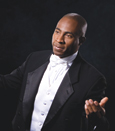 T. André Feagin is assistant professor of music, associate director of bands and director of athletic bands at the University of Texas at El Paso.
T. André Feagin is assistant professor of music, associate director of bands and director of athletic bands at the University of Texas at El Paso.
 Scott Hanna is assistant director of bands at The University of Texas, where he directs the Symphony Band and Chamber Winds and is associate director of the Longhorn Band.
Scott Hanna is assistant director of bands at The University of Texas, where he directs the Symphony Band and Chamber Winds and is associate director of the Longhorn Band.
 Linda R. Moorhouse is interim director of bands at the University of Illinois, where she also teaches courses in instrumental conducting and wind literature.
Linda R. Moorhouse is interim director of bands at the University of Illinois, where she also teaches courses in instrumental conducting and wind literature.
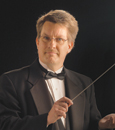 Bill Thomas is director of bands at Shawnee Mission West High School in Overland Park, Kansas.
Bill Thomas is director of bands at Shawnee Mission West High School in Overland Park, Kansas.
